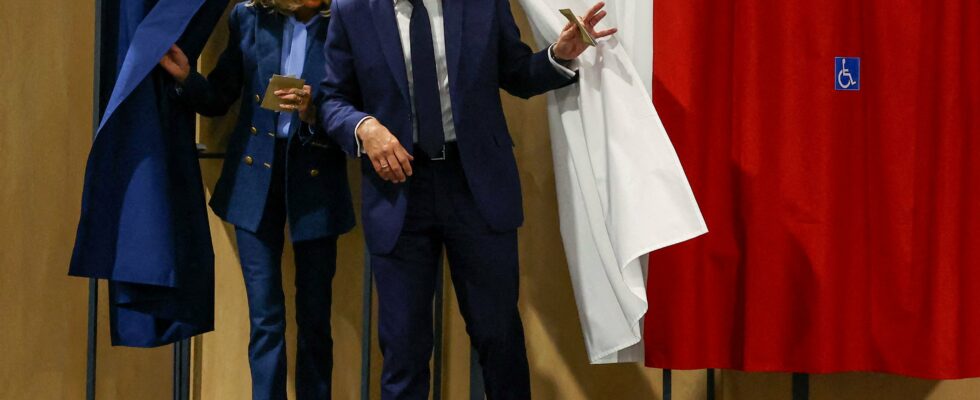France is entering a period of political uncertainty, following the European elections on Sunday June 9. Following the historic score of the far-right National Rally party, which came in first position with 31.3% of the votes, according to the latest figures of the Ministry of the Interior, Emmanuel Macron announced on Sunday evening the dissolution of the National Assembly.
The decision of the President of the Republic thus provokes the first early legislative elections since 1997. An announcement intended as a response to the defeat of the presidential camp, although it itself raises many questions.
How will the new legislative elections take place?
In his televised address, President Emmanuel Macron announced on Sunday evening his signing of a decree calling for legislative elections. These “will be held on June 30 for the first round, and July 7 for the second”, specified the head of state. A deadline in accordance with article 12 of the Constitutionwhich provides that this early vote must take place “at least twenty days and forty days at most after the dissolution”.
A three-week flash electoral campaign therefore opens before the first round of the legislative elections. As recalled the website of the Ministry of the Interior, the “official” campaign will open “from the second Monday preceding polling day”, i.e. June 17. Until then, each party will have to nominate candidates for the 577 electoral constituencies in France, and outgoing deputies are authorized to represent themselves.
Once the second round has passed, the Constitution stipulates that the new National Assembly should meet “on the second Thursday following its election”, that is to say on July 18. One week before the Paris Olympic Games, scheduled from July 26 to August 11. In the meantime, the vote on legislative texts is suspended in the lower house of Parliament, and the current government manages current affairs. “The entire program is canceled,” a parliamentary source told AFP. “It’s a bit of a blow. Nobody saw the blow coming.”
Will the far right unite?
Gathering nearly 40% of the votes in Sunday’s European election, the far-right National Rally and Reconquest parties (5.5% of the votes) in particular could be tempted to come to an agreement in order to obtain a parliamentary majority.
Sunday evening, the president of the RN group in the National Assembly, Marine Le Pen, affirmed that her party is “ready to exercise power”. However, an absolute majority seems difficult to achieve for the RN: to do this it will have to increase its current group from 88 to 289 deputies.
However, the National Rally does not seem to be banking on an alliance on the right to obtain 200 additional elected officials. In a interview Monday for RTLRN deputy Sébastien Chenu affirmed that the RN will not make a party agreement but will propose “an electoral platform” which “will address everyone outside the political parties”.
Despite everything, the head of the Reconquest list and niece of Marine Le Pen, Marion Maréchal, reiterated on Sunday her call for a union of nationalist rights. She said she was “ready to meet in the coming days Marine Le Pen and Jordan Bardella”, current president of the RN, as well as the president of the Republicans (LR) Éric Ciotti and that of Debout la France, Nicolas Dupont-Aignan. For his part, the president of Reconquête, Éric Zemmour, called on Sunday the RN and LR for “the broadest union of the rights”. A notable change in strategy, whereas until now he had advocated a frontal attack against the Lepenists.
Will Nupes be reactivated?
Divided in the European elections, the left sees the question of a new union arriving much faster than expected. A major challenge after the implosion last fall of the previous Nupes alliance, born during the 2022 legislative elections.
If the appeals have multiplied since Sunday evening, nothing seems certain. While the president of the Ecologists, Marine Tondelier, estimated that “the situation is too serious to waste hours tearing each other apart”, the first secretary of the Socialist Party (PS), Olivier Faure, estimated that the “report of strength […] evolved” between the left-wing parties after the European elections.
A reference to third place won by his ally Raphaël Glucksmann (13.8%), ahead of the head of the France Insoumise (LFI) list, Manon Aubry (9.9%). Thus, the PS is calling for a union “on the basis of the line cleared this evening by Glucksmann’s score”, its spokesperson, Dieynaba Diop, said on Sunday.
Although LFI coordinator Manuel Bompard said on Sunday he was in favor of continuing the “uniting process begun” in 2022, the Insoumis seem determined to want to impose their line and the Nupes program. “Woe to us if we start to hide half of the program again so as not to cause fear,” warned the president of the LFI group in the National Assembly, Jean-Luc Mélenchon, on Sunday.
What strategy for the presidential camp?
Coming second in the European elections, with 14.6% of the votes, the presidential camp will have to fight again in the Assembly. While Emmanuel Macron promised on Sunday to speak during the week to detail the “orientation” that he believes is “just for the nation”, the outgoing president of the National Assembly, Yaël Braun-Pivet, spoke said to be in favor on Monday of “the broadest possible coalitions” with a view to the legislative elections, during a interview for France 2. She thus believes that there is a “need to cooperate with the Senate, with the President of the Senate, with the LR and also cooperate with the socialists, the ecologists”.
The day before, the Minister of Foreign Affairs and boss of the Renaissance party, Stéphane Séjourné, had also launched a call “for the mobilization of all republican forces”. However, he clarified that “the outgoing deputies from the Republican field will thus be able to benefit from our investiture if they are in agreement with the project presented” by the presidential majority.
